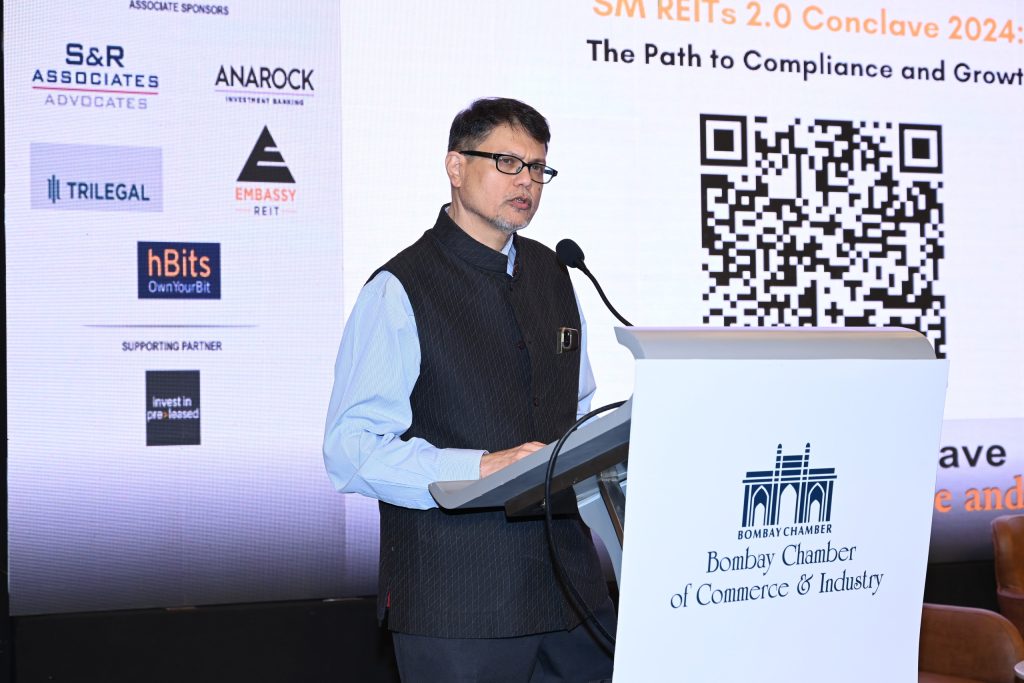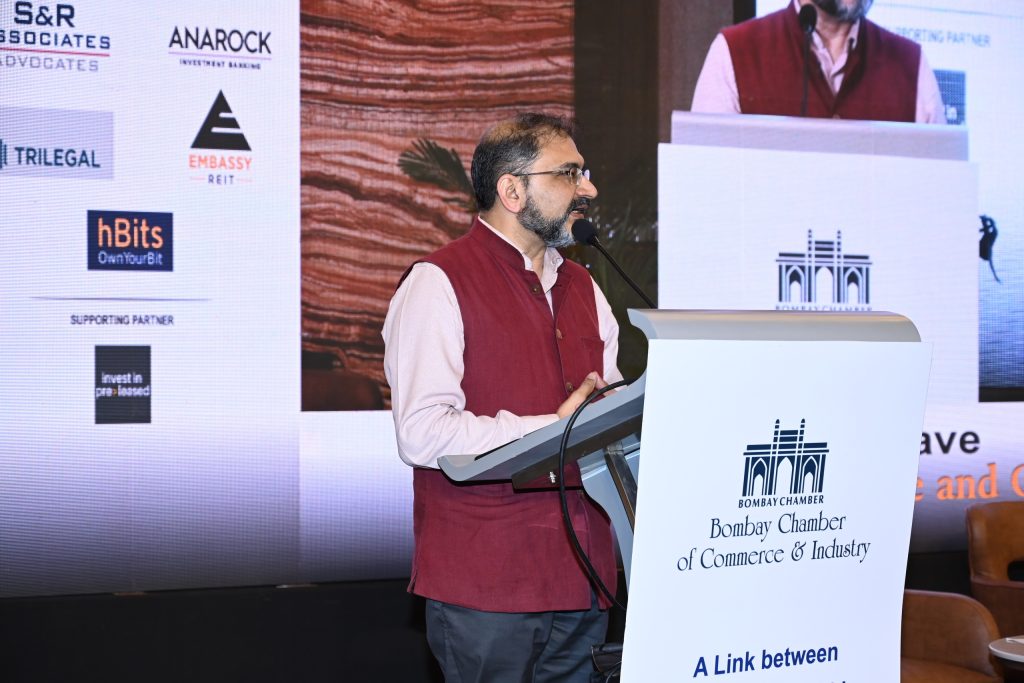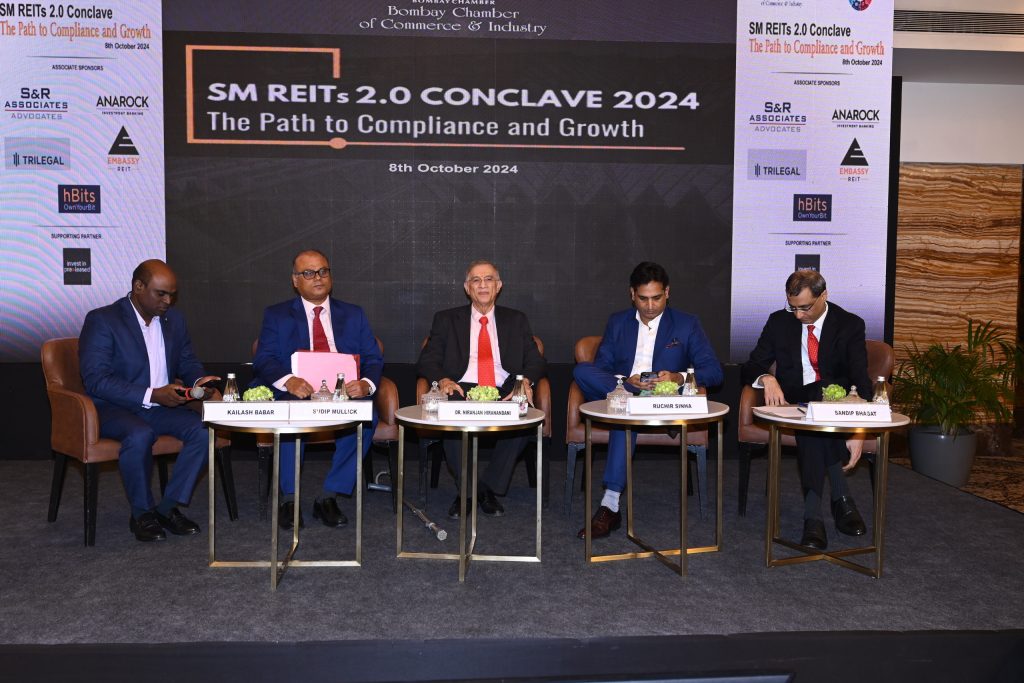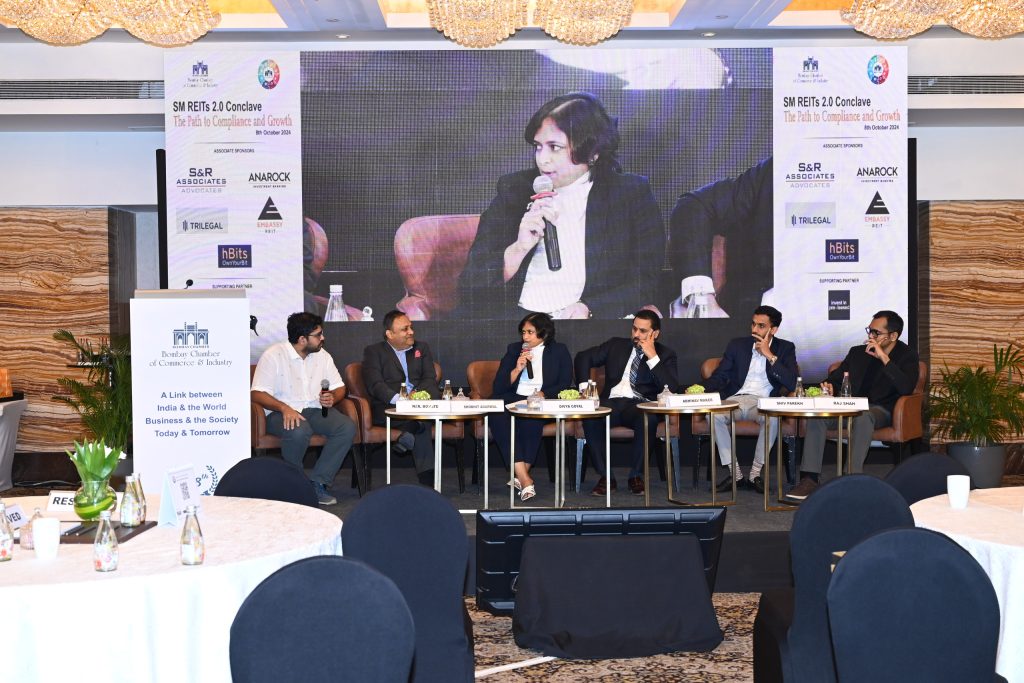Blog
Top Stories
Bombay Chamber’s Landmark Conclave on SM REITs 2.0: The Path to Compliance & Growth Focuses on the Potential of Monetising Real Estate
Mumbai, October 8, 2024 – India’s Small and Medium Real Estate Investment Trusts (SM REITs) market is on track to exceed $60 billion by 2026, driven by Mumbai’s significant completed stock and bolstered by recent tax reforms under the Union Budget 2024-25. With enhanced transparency, investor protection, and a growing demand for fractional ownership, SM REITs are fast becoming an attractive investment option poised to revitalise the commercial real estate market and boost investor confidence.
Against this promising backdrop, the Bombay Chamber of Commerce and Industry hosted the Conclave on SM REITs 2.0: The Path to Compliance & Growth, under the aegis of the PE & VC Committee. The conclave focused on the transformative potential of SM REITs, regulated by SEBI as of March 8, 2024, and featured key industry stakeholders discussing the evolving regulatory landscape and growth opportunities.

Ashith Kampani, Board Member and Chair of the PE & VC Committee, Bombay Chamber, and Chairperson of Cosmic Mandala 15 Group, in his welcome address, stated, “The potential market size for SM REITs in India is projected to exceed $60 billion by 2026. The regulation of fractional ownership of real estate assets is a commendable step that will encourage foreign direct investment from global retail investors.”

Sanjay Dutt, Board Member and MD & CEO of Tata Realty & Infrastructure, set the stage by emphasising India’s robust real estate demand, “India is witnessing unprecedented office space absorption. For the first time in the history of the country, for the 2024 calendar year, India will witness the highest office absorption in the country. By the end of 2024, net absorption is likely to touch 65 million sq. ft., with the gross figure approaching 80 million sq. ft. This growth extends beyond the top eight cities and opens up new opportunities for developers and investors nationwide.” Dutt praised SEBI’s regulations for transforming India’s unregulated real estate sector into an institutionalized market.

In his Keynote Address, Shri Pramod Rao, Executive Director of SEBI, highlighted the potential of SM REITs to unlock value from India’s real estate wealth, which comprises over half of the country’s total wealth. He noted, “A report computes the wealth of Indians, and states that wealth in the form of real estate exceeds half of the total wealth in the whole country, with gold coming second, at 15%, bank deposits at 13%, equities at 5.8 % and insurance and pension at 5.7%, each. To me this underlines the fact that the wealth of a lot of individuals is in real estate. Real estate is the largest asset class globally, yet it is often illiquid and difficult to manage for individual investors. SM REITs convert these physical assets into financial assets, offering liquidity and fractional ownership, making it a powerful tool for financial inclusion.”

The first panel discussion, moderated by Kailash Babar, Deputy Editor at ET, explored the regulatory framework and compliance landscape for SM REITs. Expert panellists, including Sudip Mullick, Advocate, Dr. Niranjan Hiranandani, Founder & Chairman of the Hiranandani Group, Ruchir Sinha, Managing Partner at Resolute Partners, and Sandip Bhagat, Partner, S&R Associates discussed key drivers for SM REIT growth, taxation challenges, and the sector’s role in democratising real estate investment.

The second panel, led by Neil Borate, Deputy Editor at LiveMint, provided an investor-centric view of SM REITs. Industry experts Shobhit Agarwal, MD & CEO, ANAROCK Capital; Divya Goyal, Executive Director and Head of Investment Risk Monitoring Services, Consulting, India, CBRE; Abhinav Maker, Partner, Trilegal; Shiv Parekh, Founder & CEO, hBits, and Raj Shah, Co-Founder, Invest in Pre-Leased discussed differentiators between SM REITs and mainstream REITs, the sectors showing the most promise, and key concerns for investors as the market evolves.
The event was supported by Embassy REIT, Trilegal, S&R Associates, Anarock, hBits and Invest in Preleased.
CBDT signs record number of 125 Advance Pricing Agreements (APAs) in FY 2023-24
Record 125 Advance Pricing Agreements Signed by CBDT in FY 2023-24

The Central Board of Direct Taxes (CBDT) has entered into a record 125 Advance Pricing Agreements (APAs) in FY 2023-24 with Indian taxpayers. This includes 86 Unilateral APAs (UAPAs) and 39 Bilateral APAs (BAPAs). This marks the highest ever APA signings in any financial year since the launch of the APA programme. The number of APAs signed in FY 2023-24 also represents a 31% increase compared to the 95 APAs signed during the preceding financial year. With this, the total number of APAs since inception of the APA programme has gone up to 641, comprising 506 UAPAs and 135 BAPAs.
During FY 2023-24 CBDT also signed the maximum number of BAPAs in any financial year till date. The BAPAs were signed as a consequence of entering into Mutual Agreements with India’s treaty partners namely Australia, Canada, Denmark, Japan, Singapore, the UK and the US.
The APA Scheme endeavours to provide certainty to taxpayers in the domain of transfer pricing by specifying the methods of pricing and determining the arm’s length price of international transactions in advance for a maximum of five future years. Further, the taxpayer has the option to rollback the APA for four preceding years, as a result of which, tax certainty is provided for nine years. The signing of bilateral APAs additionally provides the taxpayers with protection from any anticipated or actual double taxation.
The APA programme has contributed significantly to the Government of India’s mission of promoting ease of doing business, especially for Multi National Enterprises () which have a large number of cross-border transactions within their group entities.
International Symposium on Health Governance in a Political Landscape
International Symposium on Health Governance in a Political Landscape

Centre for Trade and Investment Law (CTIL), Indian Institute of Foreign Trade established by Ministry of Commerce and Industry, Government of India, in collaboration with Centre for Justice, Law and Society (CJLS) at Jindal Global Law School (JGLS), recently organised the International Symposium on Health Governance in a Political Landscape: Interplay of Health Law, Society and Political Economy.
Dr. V.K. Paul, Member, NITI Aayog delivered the inaugural address highlighting the importance of access to medicine and right to health and shared his experiences for policy implementation during the COVID-19 pandemic. Dr. Paul emphasised the need for inspiring leadership in policymaking, particularly health policy, by citing the example of India’s leadership as a vaccine supplier to the developing countries during the COVID-19 pandemic. Dr. Paul also discussed how the deficiencies of India’s Epidemic Diseases Act, 1897 were addressed by invoking the Disaster Management Act, 2005 for implementing the health-related emergency measures during the COVID-19 pandemic. Prof. C. Raj Kumar, Vice Chancellor, O.P. Jindal Global University & Dean, JGLS delivered opening remarks along with the welcome address by Prof. James J. Nedumpara, Head & Professor, CTIL and Prof. Dipika Jain, Professor, JGLS & Director, CJLS respectively.
Hon’ble Mr. Justice Ravindra Bhat, Former Judge, Supreme Court of India chaired the plenary session 1 on the theme “Economic Policies, TRIPS and Healthcare: Building Bridges for Access”. Mr. Justice Bhat highlighted the importance of public interest as a ground for granting injunction in pharmaceutical patent disputes. Mr. Justice Bhat focussed on access to health and its intersection with the Intellectual property Right laws in broader parlance and interlinkages between health, trade, and access to medicines which balance economic and public rights. The panelists emphasised the need for innovative policy solutions and greater collaboration between governments, pharmaceutical companies, and international organizations to promote affordable access to medicines for all.
The second plenary session on the theme “Ink & Insight: Living the Scholarly Life Through Thought, Research & Publication” focused on the role of research and publication in shaping public health policy, particularly evidence-based policymaking. The panelists highlighted the influence of economic interests and conflicts of interest in health policy formulation and stressed on the importance of transparency in policymaking.
Dr. Sharmila Mary Joseph, Principal Secretary of Kerala’s Local Self-Government and Women & Child Development Department, delivered a special address that emphasised local bodies’ crucial role in addressing healthcare challenges and utilizing development funds effectively. Subsequently, thematic sessions explored diverse aspects of health governance, including intellectual property rights (IPRs), medicine accessibility, research ethics, and technology’s impact on health outcomes.
The first day of symposium concluded with a special address by Prof. Chantal Thomas, Vice Dean and Radice Family Professor of Law, Cornell Law School, United States of America highlighted India’s significant role in healthcare, emphasising its moral leadership during Covid-19 and in bringing out the Doha 2001 declaration. She called for an analytical shift in legal and political discourse, advocating for dynamic trade models that consider gender and promoting participatory politics in international trade law.
The thematic sessions on Day 2 featured esteemed speakers and participants delving into critical health governance issues, particularly in TWAIL and Health Equity, abortion rights, reproductive justice, and TRIPS and regional integration in health. Both days’ thematic sessions saw discussions among eminent academicians such as Prof. (Dr.) B.S. Chimni, Distinguished Professor of International Law, JGU; Professor (Dr.) S. G. Sreejith, Professor & Executive Dean, Jindal Global Law School & Executive Director, Centre for International Legal Studies, JGU; Prof. James J. Nedumpara, Head & Professor, CTIL; Dr. Sylvia Karpagam, Public Health Doctor and Researcher, Bengaluru; Prof. Leila Choukroune, Professor of International Economic Law & Director of the University of Portsmouth Thematic Initiative in Democratic Citizenship; Prof. Shailja Singh, Associate Professor, CTIL; Prof. Shiny Pradeep, Assistant Professor, CTIL; and the participants.
The symposium ended with a special address by Dr. Anup Wadhawan, former Commerce Secretary, Government of India and a distinguished lecture by Prof. Lorand Bartels on “International Economic Law and Right to Health”. Dr. Anup Wadhawan emphasised the complexities of ensuring access to medicines, urging conscious policy choices like reforming the IPR regime for public health goals. Prof. Bartels emphasized that health is reiterated a fundamental human right within international law. He also cited the Chilean alcohol tax case to underscore challenges in policy implementation. Prof. Ashita Dawer, Associate Professor of Economics, Jindal Global Law School, JGU delivered the concluding remarks. This session was moderated by Ms. Ronjini Ray, Consultant (Legal) Assistant Professor, CTIL.
The Symposium offered scholars and early-stage academicians, both domestic and international, a platform to present their research articles to expert commentators. Following feedback from the commentators, scholars will refine their articles for publication in a Special Issue of Jindal Global Law Review. Prof. James J. Nedumpara, Head & Professor, CTIL delivered the concluding observations of the Symposium.


It is a long established fact that a reader will be distracted by the readable content of a page when lookin







